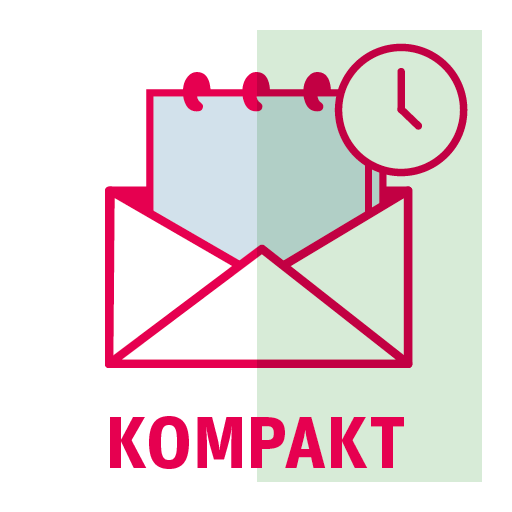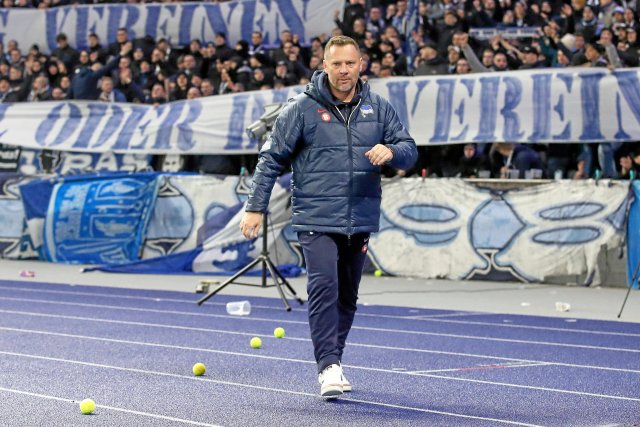Tennis balls pave his path: Hertha’s coach Pal Dardai comes from Ostkurve after talking to ultras.
Photo: imago/Daniel Lakomski
“That wasn’t our Hertha,” Pal Dardai said after the defeats in the 2nd Bundesliga at SV Wehen Wiesbaden and last Wednesday in the quarter-finals of the DFB Cup against 1. FC Kaiserslautern. On the one hand, the Hertha BSC coach complained about the many absences due to injuries, but on the other hand, he was also not satisfied with the performances of his footballers. And so the Hungarian wanted to see his team “march” against Hamburger SV. After the game on Saturday, Dardai’s mood was a little better: “I liked the work today, we fought again.” The victory went 2-1 to HSV, who deservedly took the three points from the capital.
nd.Kompakt – our daily newsletter

Our daily newsletter nd.Compact brings order to the news madness. Every day you will receive an overview of the most exciting stories from the world editorial staff. Get your free subscription here.
It was a long evening in Berlin’s Westend. More remarkable than the sport on the pitch were the actions in the stands. The fan protest that is currently common in all stadiums against the German Football League’s dubious investor plans led to a five-minute interruption in the first half. So far, so normal. In the second round, the game was about to be abandoned: tennis balls were thrown onto the grass again – a challenge in the Olympic Stadium with the blue running track. This time from the East Curve of the Hertha fans. After 20 minutes without football and lots of conversations, referee Daniel Schlager asked the teams into the dressing room.
Dardai, who had been in contact with the Ultras during the break, later showed understanding: “The fans also have their world, you have to accept that.” A few whistles from other blocks showed that not everyone liked the long wait. Hertha’s stadium announcer Fabian Wachsmann didn’t make the strange atmosphere any better with several clumsy attempts. “Protest with all honor, but that’s okay now,” he demanded, for example. He was right about one thing: “The message has arrived.” Such protests are particularly effective during a live game on free-to-air television.
Wachsmann was completely wrong with a different announcement. “Don’t throw objects onto the field, you’ll disrupt the flow of our team’s game.” The runner-up from Hamburg didn’t show much either, in any case not enough for a candidate for promotion. But until the break in the 53rd minute, only HSV had played football – with 65 percent possession and some promising scoring chances in the first half.
It wasn’t until referee Schlager whistled the game again after just over half an hour that a football game developed. Four minutes later, Miro Muheim gave the guests the lead. And Hertha BSC suddenly defended itself. Fabian Reese, who came on after an hour of play, brought the momentum. Two minutes later, the winger equalized with a long-range shot, and Haris Tabakovic scored to make it 1-1. Fresh blood brought Hamburg victory: Ludovit Reis headed in the 83rd minute after a cross from Ransford-Yeboah Königsdörffer to make it 2-1.
While HSV is back in a promotion spot, Hertha BSC has lost two goals within a week with three defeats. Now ten points behind the relegation zone, the Berliners can probably forget about direct promotion. The end in the cup was even more bitter. Because Hertha “lost without a fight” against a lower-ranked league competitor, as goal scorer Reese criticized after the 3-1 defeat against Kaiserslautern. And because Kay Bernstein’s dream of the final in the Olympic Stadium remains unfulfilled. The Hamburg fans also honored the late Hertha president once again. “The fight for your values lives on,” read one banner. This also includes protests like the one on Saturday in the Olympic Stadium.
As a reminder to continue Bernstein’s “Berlin path”, his last words to the supporters could be read again at the cup game on Wednesday in the Olympic Stadium: “Let us nurture and strengthen this community in order to gain strength from it.” Hertha is even more important than investors -Fans worry about the future of their club.
Become a member of the nd.Genossenschaft!
Since January 1, 2022, the »nd« will be published as an independent left-wing newspaper owned by the staff and readers. Be there and support media diversity and visible left-wing positions as a cooperative member. Fill out the membership form now.
More information on www.dasnd.de/genossenschaft
